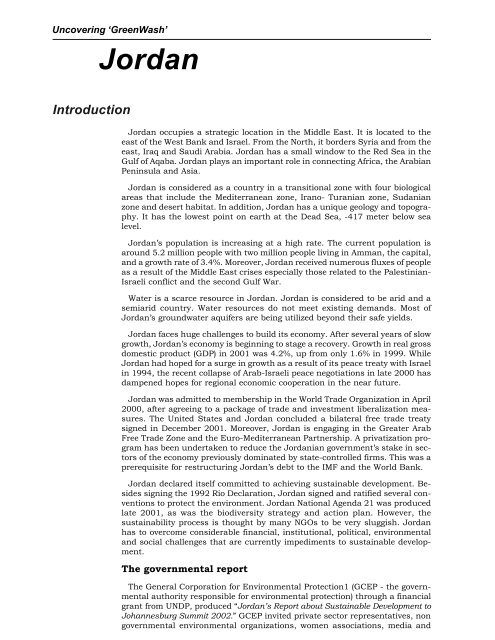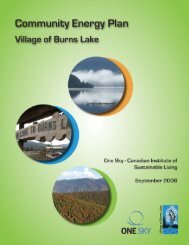Danish
Uncovering Greenwash: Challenging our governments ... - One Sky
Uncovering Greenwash: Challenging our governments ... - One Sky
- No tags were found...
You also want an ePaper? Increase the reach of your titles
YUMPU automatically turns print PDFs into web optimized ePapers that Google loves.
Uncovering ‘GreenWash’<br />
Jordan<br />
Introduction<br />
Jordan occupies a strategic location in the Middle East. It is located to the<br />
east of the West Bank and Israel. From the North, it borders Syria and from the<br />
east, Iraq and Saudi Arabia. Jordan has a small window to the Red Sea in the<br />
Gulf of Aqaba. Jordan plays an important role in connecting Africa, the Arabian<br />
Peninsula and Asia.<br />
Jordan is considered as a country in a transitional zone with four biological<br />
areas that include the Mediterranean zone, Irano- Turanian zone, Sudanian<br />
zone and desert habitat. In addition, Jordan has a unique geology and topography.<br />
It has the lowest point on earth at the Dead Sea, -417 meter below sea<br />
level.<br />
Jordan’s population is increasing at a high rate. The current population is<br />
around 5.2 million people with two million people living in Amman, the capital,<br />
and a growth rate of 3.4%. Moreover, Jordan received numerous fluxes of people<br />
as a result of the Middle East crises especially those related to the Palestinian-<br />
Israeli conflict and the second Gulf War.<br />
Water is a scarce resource in Jordan. Jordan is considered to be arid and a<br />
semiarid country. Water resources do not meet existing demands. Most of<br />
Jordan’s groundwater aquifers are being utilized beyond their safe yields.<br />
Jordan faces huge challenges to build its economy. After several years of slow<br />
growth, Jordan’s economy is beginning to stage a recovery. Growth in real gross<br />
domestic product (GDP) in 2001 was 4.2%, up from only 1.6% in 1999. While<br />
Jordan had hoped for a surge in growth as a result of its peace treaty with Israel<br />
in 1994, the recent collapse of Arab-Israeli peace negotiations in late 2000 has<br />
dampened hopes for regional economic cooperation in the near future.<br />
Jordan was admitted to membership in the World Trade Organization in April<br />
2000, after agreeing to a package of trade and investment liberalization measures.<br />
The United States and Jordan concluded a bilateral free trade treaty<br />
signed in December 2001. Moreover, Jordan is engaging in the Greater Arab<br />
Free Trade Zone and the Euro-Mediterranean Partnership. A privatization program<br />
has been undertaken to reduce the Jordanian government’s stake in sectors<br />
of the economy previously dominated by state-controlled firms. This was a<br />
prerequisite for restructuring Jordan’s debt to the IMF and the World Bank.<br />
Jordan declared itself committed to achieving sustainable development. Besides<br />
signing the 1992 Rio Declaration, Jordan signed and ratified several conventions<br />
to protect the environment. Jordan National Agenda 21 was produced<br />
late 2001, as was the biodiversity strategy and action plan. However, the<br />
sustainability process is thought by many NGOs to be very sluggish. Jordan<br />
has to overcome considerable financial, institutional, political, environmental<br />
and social challenges that are currently impediments to sustainable development.<br />
The governmental report<br />
The General Corporation for Environmental Protection1 (GCEP - the governmental<br />
authority responsible for environmental protection) through a financial<br />
grant from UNDP, produced “Jordan’s Report about Sustainable Development to<br />
Johannesburg Summit 2002.” GCEP invited private sector representatives, non<br />
governmental environmental organizations, women associations, media and



